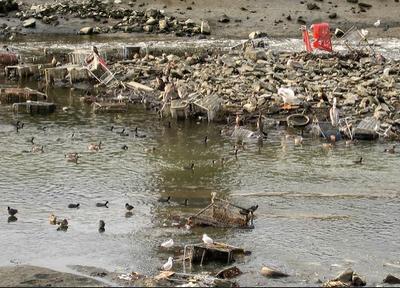
SACRAMENTO, California, April 15, 2019 (ENS) – California Attorney General Xavier Becerra today joined a multistate letter urging the U.S. Environmental Protection Agency and U.S. Army Corps of Engineers to withdraw a proposed rule that would exclude many U.S. waterways from vital federal protections.
The proposal is the most recent step in the Trump Administration’s plan to dismantle long-standing pollution control measures in the Clean Water Act.

The proposed rule seeks to repeal the 2015 Clean Water Rule enacted during the Obama Administration and replace it with a narrow definition of protected waters. This change would eliminate federal protections for many wetlands, rivers, creeks, streams, and tributaries.
Under the revised rule, a large portion of California’s surface waters would be deprived of federal protection.
“California can’t and won’t go back to a time when water pollution was the norm,” said Becerra. “This proposal would significantly harm California waterways and the people, plants, and animals who depend on them. We urge the EPA and Army Corps to withdraw this ill-conceived proposal.”
The agencies’ proposal is the second step in a two-step process to review and revise the definition of “waters of the United States” consistent with President Trump’s February 2017 Executive Order entitled “Restoring the Rule of Law, Federalism, and Economic Growth by Reviewing the ‘Waters of the United States’ Rule.”
“Our proposal would replace the Obama EPA’s 2015 definition with one that respects the limits of the Clean Water Act and provides states and landowners the certainty they need to manage their natural resources and grow local economies,” said EPA Administrator Andrew Wheeler.
“For the first time, we are clearly defining the difference between federally protected waterways and state protected waterways. Our simpler and clearer definition would help landowners understand whether a project on their property will require a federal permit or not, without spending thousands of dollars on engineering and legal professionals,” Wheeler said.
“EPA and the Army together propose this new definition that provides a clear and predictable approach to regulating ‘waters of the United States.’ We focused on developing an implementable definition that balances local and national interests under the Clean Water Act,” said R.D. James, assistant secretary of the Army for civil works. “I have heard from a wide range of stakeholders on Clean Water Act implementation challenges. This proposed definition provides a common-sense approach to managing our nation’s waters.”
But the attorneys general do not agree. In their letter, they assert that the replacement rule is inconsistent with and contradictory to the Clean Water Act, is unlawful under the Administrative Procedure Act, and would have a negative impact on the nation’s waters.

“The Agency’s proposal to revise the rule is arbitrary and capricious. It is furthermore unlawful in that it fails to consider important issues, lacks factual and legal support, and ignores the agencies’ previous findings and conclusions that were based on current peer-reviewed science. The attorneys general urge the agencies to withdraw the unlawful rule,” the letter states.
The attorneys general argue in their letter, “The Agencies have failed to provide a rational basis for the proposed rule, and instead have asserted a purported federalism rationale, with an emphasis on non-regulatory programs at the expense of water pollution control, and purported constitutional concerns, that all misconstrue the Act and applicable law.”
“In addition,” the letter states, “the proposed rule’s exclusion of interstate waters from the Act’s protections is contrary to the Act and controlling precedent. And contrary to the Agencies’ assertions, the proposed rule would not ensure clarity and predictability but instead would create regulatory uncertainty. The Agencies also have employed a flawed economic analysis that violates applicable standards and grossly underestimates the benefits that will be lost if the proposed rule were to become law.”
Attorney General Becerra joins the Attorneys General of New York, Connecticut, Maine, Maryland, Massachusetts, Michigan, New Jersey, New Mexico, Oregon, Rhode Island, Vermont, Virginia, Washington, and the District of Columbia in filing the letter.
The 60-day public comment period on this revision closes today.
Copyright Environment News Service (ENS) 2019. All rights reserved.
© 2019, Environment News Service. All rights reserved. Content may be quoted only with proper attribution and a direct link to the original article. Full reproduction is prohibited.
